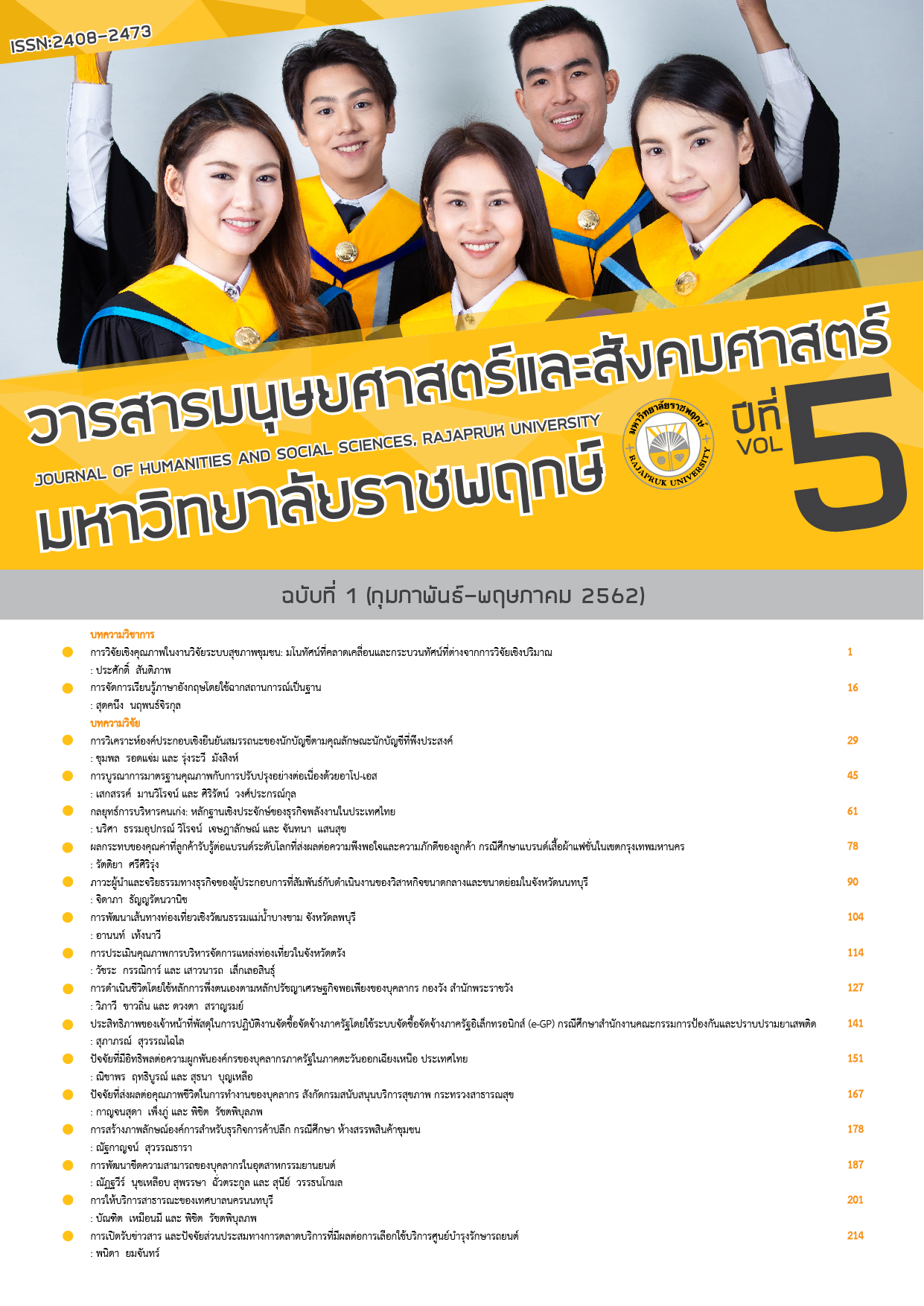The Development of Cultural Tourism Route along the Bangkham River
Main Article Content
Abstract
The objectives of this study were to study the problems in developing cultural tourism, to conclude the opinion in cooperation of community and tourism attractions and development guidelines for cultural tourism route of Bangkham River, Lopburi. From the study, the results of the first objective stating that to study the problems in developing cultural tourism route of Bangkham River, Lopburi, indicated that the problems were from water hyacinth overgrowth which blocked water transportation and rotten the water. The results of the second objective, to study the opinion in cooperation of community and tourism attractions in the area of Bangkham river, Lopburi, indicated that local people were benefited from Bangkham river in the form of consumption and fishery. However, people of Bangkham river community still lack in confidence of developing Bangkham river to be an interesting tourism attraction. The results of the third objective stating that to study of development guidelines for cultural tours of Bangkham River, Lopburi, indicated that 1) there should be more attractions and activities other than nature cruise, 2) the government should support the development of tourism in term of funding, machineries, and personnel. The policy of controlling and constant water hyacinth should be enacted for cleanliness of water, 3) the local people should cooperate and support the government in order to develop cultural tours of Bangkham river, and 4) the community leaders should be the center for listening to the problem of people and help them accordingly in both the development of tourism and business.
Article Details
References
ปรัชญาพร พัฒนผล. (2554). การพัฒนาเส้นทางท่องเที่ยววัฒนธรรมแม่น้ำเพชรบุรี. วิทยานิพนธ์ศิลปศาสตรมหาบัณฑิต มหาวิทยาลัยธรรมศาสตร์.
วรรณศิริ เดชะคุปต์ และ ปรีดี พิศภูมิวิถี. (2554). กรุงเก่า เล่าเรื่อง. กรุงเทพฯ: สำนักพิมพ์มติชน.
วิกิพีเดีย สารานุกรมเสรี. (2555). แม่น้ำบางขาม. ค้นเมื่อ 10 มกราคม 2561, จาก https://th. wikipedia.org/wiki/แม่น้ำบางขาม
สุเทพ สิงห์ฆาฬะ. (2560). แนวทางการพัฒนาการท่องเที่ยวที่ยั่งยืนในมุมมองของผู้ประกอบการท่องเที่ยวและองค์กรปกครองส่วนท้องถิ่น ตำบลกมลา อำเภอกะทู้ จังหวัดภูเก็ต. วารสารมนุษยศาสตร์และสังคมศาสตร์ มหาวิทยาลัยราชพฤกษ์, 3(2): ค้นเมื่อ 28 มิถุนายน 2561, จาก https://www.tcithaijo.org/index.php/rpu/article/view/112615/87717
Cohen, J. M. and Uphoff. (1981). N.T. Rural Development Participation: Concept and Measures for Project Design Implementation and Evaluation. Rural Development Committee Center for International Studies , Cornell University .
Dechakhup, W. and Phitphumwithi, P. (2011). Krung Kao Lao Ruang. Bangkok: Matichon Public Company Limited. (in Thai)
Jitangwattana, B. (2006). Tourism Resources Development and Reservation. Bangkok. (in Thai)
Pattanapon, P. (2011). The Development of Cultural Tourism Route along the Phetchaburi River. A thesis of the Degree of Master of Art Cultural Management college of Innovation , Thammasat University. (in Thai)
Singkhalah, S. (2017). Development of Sustainable Tourism at Kamala Sub-district and Kathu District, Phuket in Tourism Operators’ and Local Government Officer’ Perspective. Journal of Humanities and Social Sciences, Rajapruk University, 3(2): retrieved on June 28th, 2018 from https://www.tcithaijo.org/ index.php/rpu/article/view/112615/87717 (in Thai)
Wikipedia. (2012). Bangkham River. retrieved on January 10th, 2018 from https://th.wikipedia.org/wiki/แม่น้ำบางขาม (in Thai)


